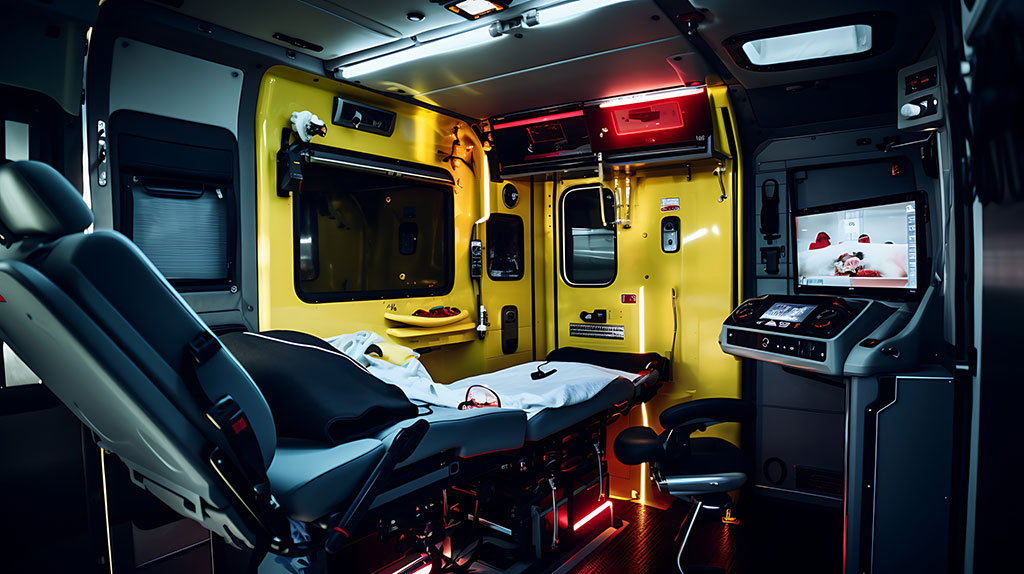MRI-Equipped Ambulance Could Be a Game-Changer for Stroke Care
|
By HospiMedica International staff writers Posted on 03 Nov 2023 |

The critical nature of timing in treating a stroke is widely recognized, and faster medical response often leads to more favorable recoveries. This urgency is especially relevant with medications like clot-dissolving tPA, which must be administered within a narrow timeframe. The challenge, however, lies in the timely execution of necessary diagnostic studies. Now, the findings of a new trial in which researchers equipped an ambulance with a portable MRI have demonstrated the potential of an MRI-equipped ambulance in treating stroke patients.
Currently, some hospitals deploy mobile stroke units with CT scanners, but these are not without their drawbacks, such as the risk of radiation. Portable MRIs, on the other hand, are free from radiation hazards and their lower magnetic fields eliminate concerns about the proximity of metal, thereby allowing for the use of other medical devices simultaneously. Unlike traditional MRI, portable units can potentially serve to identify strokes even in patients who lack a defined timeline of their stroke's onset. The latest human trial by researchers at the Medical University of South Carolina (MUSC) was based on an earlier trial that had shown it was possible to obtain MRI images in a moving ambulance on a standardized calibration model.
In the new human trial, the research team equipped an ambulance from Charleston County EMS with a portable MRI and managed to take images while driving at a slow pace around a parking area. The trial produced diagnostic-grade images from a healthy volunteer, which were then sent to hospital radiologists to be examined. While these initial findings are promising, the researchers will continue to investigate whether high-quality images can be captured at the ambulance's normal operating speed. The team is also redesigning the ergonomics of how the MRI can fit within the ambulance space. Advancements in technology and further clinical research could make MRI-equipped ambulances a revolutionary tool in emergency medical care, offering critical diagnostic capabilities to stroke patients en route to the hospital.
“If you think about where defibrillators were 50 years ago, they were hundreds of pounds, and it really took out-of-the-box thinking to imagine they could be portable. And now, they're public access points,” said Dustin LeBlanc, M.D., director of Prehospital Medicine and associate chief medical officer for Emergency Management at MUSC. “The MRI-equipped ambulance is just another example of technology helping us to develop ways to make things faster, lighter, smaller, more portable and to get it to the patient as quickly as possible.”
“If you're somebody who could just receive tPA, you might go to a local hospital, while those who need to have advanced procedures, such as interventional neuroradiology, would go to a different hospital,” said Jillian Harvey, Ph.D., a professor in the College of Health Professions. “The imaging provided by the portable MRI scanner in the ambulance could help make that decision. If we can get that information in transit and the decision process going before they even arrive at the hospital, then we can shorten the time to care and treatment.”
Related Links:
MUSC
Latest Critical Care News
- Intranasal Spray to Prevent Illnesses from Respiratory Viruses
- Gut Bacteria from Amphibians and Reptiles Show Complete Tumor Elimination
- High-Dose Inhaled Nitric Oxide Emerges as Promising Antimicrobial Therapy
- AI Risk Prediction Tool Improves Treatment of Cancer Patients after Heart Attack
- Glowing Bacterial Sensors Could Improve Detection of Gut Illness
- Innovative ‘Poop Pills’ Dramatically Improve Cancer Treatment

- New Nanomaterial Kills Cancer Cells While Sparring Healthy Tissues
- AI Model Accurately Predicts Neurological Recovery After Cardiac Arrest
- Battery-Free Nano-Sensors Pave Way for Next-Generation Wearables
- Imaging Technology Detects Early Signs of Cardiovascular Risk Through Skin
- New Therapeutic Approach Marks Breakthrough in Pediatric Heart Disease
- AI Model Accurately Identifies Prediabetics Using Only ECG Data
- Injectable Disease-Fighting Nanorobots to Improve Precision Cancer Therapy
- Web-Based Tool Enables Early Detection and Prevention of Chronic Kidney Disease
- Tiny Sensor to Transform Head Injury Detection
- Bacterial Behavior Breakthrough to Improve Infection Prevention in Biomedical Devices
Channels
Artificial Intelligence
view channelCritical Care
view channel
Intranasal Spray to Prevent Illnesses from Respiratory Viruses
Respiratory viruses such as influenza and COVID-19 hospitalize more than one million people in the U.S. each year, with many infections spreading through close contact in households, schools, and workplaces.... Read more
AI Risk Prediction Tool Improves Treatment of Cancer Patients after Heart Attack
Cancer patients who experience a heart attack face a uniquely dangerous combination of risks, including higher chances of death, bleeding, and repeat cardiac events. Because of this complexity, they have... Read moreSurgical Techniques
view channel
Surgical Innovation Cuts Ovarian Cancer Risk by 80%
Ovarian cancer remains the deadliest gynecological cancer, largely because there is no reliable screening test, and most cases are diagnosed at advanced stages. Thousands of patients die each year as treatment... Read more
New Imaging Combo Offers Hope for High-Risk Heart Patients
Patients with type 2 diabetes often develop complex, severe coronary artery disease involving multiple narrowed or blocked arteries, making complete revascularization difficult. Without detailed functional... Read morePatient Care
view channel
Revolutionary Automatic IV-Line Flushing Device to Enhance Infusion Care
More than 80% of in-hospital patients receive intravenous (IV) therapy. Every dose of IV medicine delivered in a small volume (<250 mL) infusion bag should be followed by subsequent flushing to ensure... Read more
VR Training Tool Combats Contamination of Portable Medical Equipment
Healthcare-associated infections (HAIs) impact one in every 31 patients, cause nearly 100,000 deaths each year, and cost USD 28.4 billion in direct medical expenses. Notably, up to 75% of these infections... Read more
Portable Biosensor Platform to Reduce Hospital-Acquired Infections
Approximately 4 million patients in the European Union acquire healthcare-associated infections (HAIs) or nosocomial infections each year, with around 37,000 deaths directly resulting from these infections,... Read moreFirst-Of-Its-Kind Portable Germicidal Light Technology Disinfects High-Touch Clinical Surfaces in Seconds
Reducing healthcare-acquired infections (HAIs) remains a pressing issue within global healthcare systems. In the United States alone, 1.7 million patients contract HAIs annually, leading to approximately... Read moreHealth IT
view channel
EMR-Based Tool Predicts Graft Failure After Kidney Transplant
Kidney transplantation offers patients with end-stage kidney disease longer survival and better quality of life than dialysis, yet graft failure remains a major challenge. Although a successful transplant... Read more
Printable Molecule-Selective Nanoparticles Enable Mass Production of Wearable Biosensors
The future of medicine is likely to focus on the personalization of healthcare—understanding exactly what an individual requires and delivering the appropriate combination of nutrients, metabolites, and... Read moreBusiness
view channel
Medtronic to Acquire Coronary Artery Medtech Company CathWorks
Medtronic plc (Galway, Ireland) has announced that it will exercise its option to acquire CathWorks (Kfar Saba, Israel), a privately held medical device company, which aims to transform how coronary artery... Read more
Medtronic and Mindray Expand Strategic Partnership to Ambulatory Surgery Centers in the U.S.
Mindray North America and Medtronic have expanded their strategic partnership to bring integrated patient monitoring solutions to ambulatory surgery centers across the United States. The collaboration... Read more
FDA Clearance Expands Robotic Options for Minimally Invasive Heart Surgery
Cardiovascular disease remains the world’s leading cause of death, with nearly 18 million fatalities each year, and more than two million patients undergo open-heart surgery annually, most involving sternotomy.... Read more

















